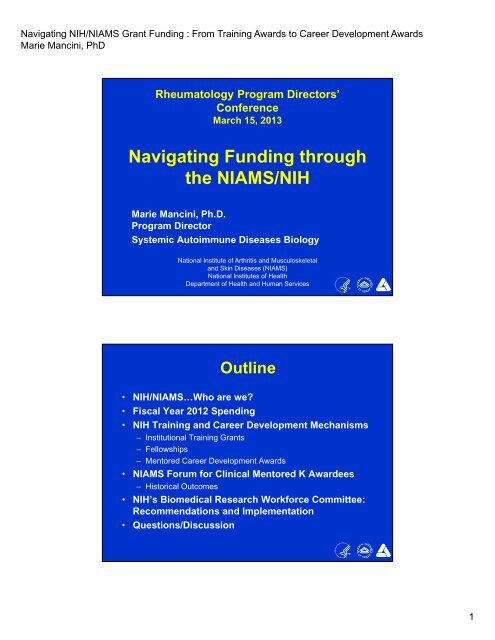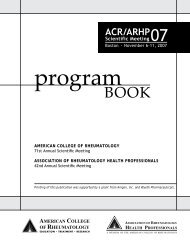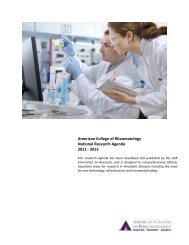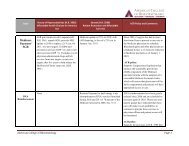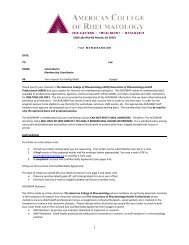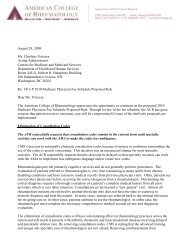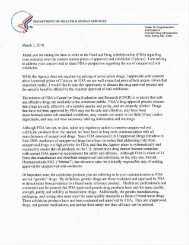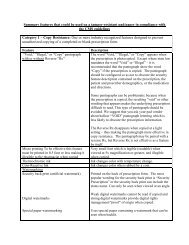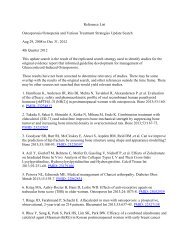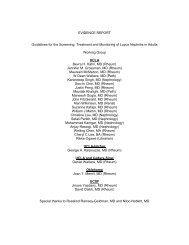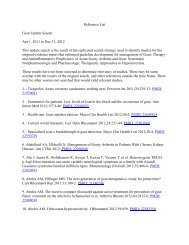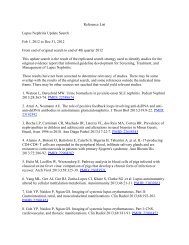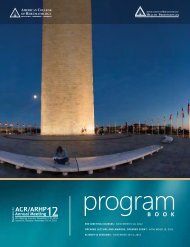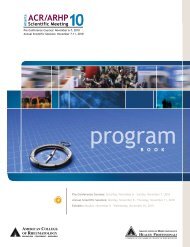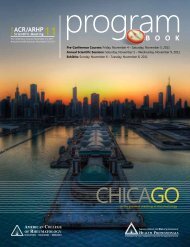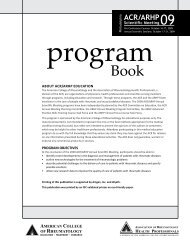Navigating NIH/NIAMS Grant Funding : From Training Awards to ...
Navigating NIH/NIAMS Grant Funding : From Training Awards to ...
Navigating NIH/NIAMS Grant Funding : From Training Awards to ...
You also want an ePaper? Increase the reach of your titles
YUMPU automatically turns print PDFs into web optimized ePapers that Google loves.
<strong>Navigating</strong> <strong>NIH</strong>/<strong>NIAMS</strong> <strong>Grant</strong> <strong>Funding</strong> : <strong>From</strong> <strong>Training</strong> <strong>Awards</strong> <strong>to</strong> Career Development <strong>Awards</strong><br />
Marie Mancini, PhD<br />
Rheuma<strong>to</strong>logy Program Direc<strong>to</strong>rs’<br />
Conference<br />
March 15, 2013<br />
<strong>Navigating</strong> <strong>Funding</strong> through<br />
the <strong>NIAMS</strong>/<strong>NIH</strong><br />
Marie Mancini, Ph.D.<br />
Program Direc<strong>to</strong>r<br />
Systemic Au<strong>to</strong>immune Diseases Biology<br />
National Institute of Arthritis and Musculoskeletal<br />
and Skin Diseases (<strong>NIAMS</strong>)<br />
National Institutes of Health<br />
Department of Health and Human Services<br />
Outline<br />
• <strong>NIH</strong>/<strong>NIAMS</strong>…Who are we?<br />
• Fiscal Year 2012 Spending<br />
• <strong>NIH</strong> <strong>Training</strong> and Career Development Mechanisms<br />
– Institutional <strong>Training</strong> <strong>Grant</strong>s<br />
– Fellowships<br />
– Men<strong>to</strong>red Career Development <strong>Awards</strong><br />
• <strong>NIAMS</strong> Forum for Clinical Men<strong>to</strong>red K Awardees<br />
– His<strong>to</strong>rical Outcomes<br />
• <strong>NIH</strong>’s Biomedical Research Workforce Committee:<br />
Recommendations and Implementation<br />
• Questions/Discussion<br />
1
<strong>Navigating</strong> <strong>NIH</strong>/<strong>NIAMS</strong> <strong>Grant</strong> <strong>Funding</strong> : <strong>From</strong> <strong>Training</strong> <strong>Awards</strong> <strong>to</strong> Career Development <strong>Awards</strong><br />
Marie Mancini, PhD<br />
National Institute of<br />
Biomedical Imaging<br />
and Bioengineering<br />
National Institute of<br />
Nursing Research<br />
National Heart, Lung,<br />
and Blood Institute<br />
National<br />
Cancer Institute<br />
National Institute<br />
of Environmental<br />
Health Sciences<br />
National Institute of<br />
General Medical<br />
Sciences<br />
National Institute of<br />
Diabetes and Digestive<br />
and Kidney Diseases<br />
National<br />
Center for<br />
Advancing Translational<br />
Sciences<br />
National<br />
Library<br />
of Medicine<br />
National<br />
Human Genome<br />
Research Institute<br />
Center for<br />
Scientific<br />
Review<br />
National Institute<br />
of Mental<br />
Health<br />
Clinical<br />
Center<br />
National Institute<br />
of Arthritis and<br />
Musculoskeletal and<br />
Skin Diseases<br />
The 27<br />
Institutes<br />
and<br />
Centers<br />
of the<br />
<strong>NIH</strong><br />
National<br />
Institute on<br />
Drug Abuse<br />
Center for<br />
Information<br />
Technology<br />
National<br />
Institute on Aging<br />
John E.<br />
Fogarty<br />
International<br />
Center<br />
National Center<br />
for Complementary<br />
and Alternative<br />
Medicine<br />
National Institute<br />
on Minority Health<br />
and Health<br />
Disparities<br />
National<br />
Institute on<br />
Alcohol Abuse<br />
and Alcoholism<br />
National Institute<br />
of Allergy and<br />
Infectious Diseases<br />
National Institute<br />
of Child Health and<br />
Human Development<br />
National Institute of<br />
Dental and Craniofacial<br />
Research<br />
National Institute<br />
on Deafness and Other<br />
Communication<br />
Disorders<br />
National Institute of<br />
Neurological Disorders<br />
and Stroke<br />
National<br />
Eye Institute<br />
<strong>NIAMS</strong>: Extramural Program Organization<br />
Dr. Stephen Katz, <strong>NIAMS</strong><br />
Direc<strong>to</strong>r<br />
Dr. Bob Carter, <strong>NIAMS</strong> Deputy<br />
Direc<strong>to</strong>r<br />
<strong>Grant</strong>s<br />
Specialists<br />
Dr. Laura Moen<br />
Division of Extramural<br />
Research Activities<br />
Ms. Melinda<br />
Nelson<br />
Chief <strong>Grant</strong>s<br />
Management Officer<br />
Dr. Susana<br />
Serrate-Sztein<br />
Division of Skin and<br />
Rheumatic Diseases<br />
8 Program<br />
Officers<br />
Dr. Joan<br />
McGowan<br />
Division of<br />
Musculoskeletal<br />
Diseases<br />
8 Program<br />
Officers<br />
<strong>NIAMS</strong><br />
SROs<br />
Dr. Charles<br />
Rafferty<br />
Chief, Scientific<br />
Review Branch<br />
Clinical<br />
Coordina<strong>to</strong>rs<br />
Review<br />
<strong>Grant</strong>s<br />
Mgt.<br />
Program<br />
2
<strong>Navigating</strong> <strong>NIH</strong>/<strong>NIAMS</strong> <strong>Grant</strong> <strong>Funding</strong> : <strong>From</strong> <strong>Training</strong> <strong>Awards</strong> <strong>to</strong> Career Development <strong>Awards</strong><br />
Marie Mancini, PhD<br />
Program Official<br />
• Responsible for the programmatic, scientific, and/or<br />
technical aspects of a grant<br />
• Provides scientific guidance <strong>to</strong> investiga<strong>to</strong>rs pre- and<br />
post-award<br />
• Develops initiatives<br />
• Provides post-award oversight<br />
<strong>NIAMS</strong>: Division of Skin and Rheumatic Diseases<br />
• Dr. Su-Yau Mao<br />
– Arthritis Biology Program<br />
• Dr. Marie Mancini<br />
– Systemic Immune Diseases Biology Program<br />
• Dr. Yan Wang<br />
– Rheumatic Diseases Genetics and Translational Research<br />
Program<br />
• Dr. Jim Witter<br />
– Rheumatic Diseases Clinical Program<br />
• Dr. Phil Tonkins<br />
– Rheumatic Diseases Biopsychosocial Research Program (includes<br />
PROMIS, FMS)<br />
http://www.niams.nih.gov/<strong>Funding</strong>/<strong>Funding</strong>_Opportunities/Supported_Scientific_Areas/default.asp<br />
3
<strong>Navigating</strong> <strong>NIH</strong>/<strong>NIAMS</strong> <strong>Grant</strong> <strong>Funding</strong> : <strong>From</strong> <strong>Training</strong> <strong>Awards</strong> <strong>to</strong> Career Development <strong>Awards</strong><br />
Marie Mancini, PhD<br />
<strong>NIH</strong> and <strong>NIAMS</strong> Spending: 2012<br />
<strong>NIAMS</strong><br />
Extramural: 84.6%<br />
IR/RMS/Other: 15.4%<br />
<strong>NIH</strong><br />
Extramural: 82.0%<br />
IR/RMS/Other: 18.0%<br />
http://www.niams.nih.gov/About_Us/Budget/12_budg<br />
et_detail.asp<br />
Support by Career Stage:<br />
Ph.D. Track<br />
Award<br />
Types<br />
T32 T32<br />
K99/R00<br />
F31 F32 K01 K22 K99 R00<br />
phase phase<br />
K02 F33<br />
Your Career<br />
Stage<br />
Graduate<br />
Student<br />
Ph.D.<br />
Faculty<br />
Position<br />
Independent<br />
Investiga<strong>to</strong>r<br />
R and P awards<br />
4
<strong>Navigating</strong> <strong>NIH</strong>/<strong>NIAMS</strong> <strong>Grant</strong> <strong>Funding</strong> : <strong>From</strong> <strong>Training</strong> <strong>Awards</strong> <strong>to</strong> Career Development <strong>Awards</strong><br />
Marie Mancini, PhD<br />
Support by Career Stage:<br />
Clinician Scientist Track<br />
Award<br />
Types<br />
T32<br />
F32 K08 K22<br />
K23<br />
K99/R00<br />
K99<br />
phase<br />
R00<br />
phase<br />
K02 F33 K24<br />
Your Career<br />
Stage<br />
Medical<br />
Student<br />
M.D.<br />
Clinical<br />
<strong>Training</strong><br />
Phase<br />
Research<br />
<strong>Training</strong><br />
Phase<br />
Faculty<br />
Position<br />
Independent<br />
Investiga<strong>to</strong>r<br />
R and P awards<br />
<strong>Grant</strong> Mechanisms Supported by<br />
<strong>NIAMS</strong>: Ts and Fs<br />
These are also called the Ruth L. Kirschstein National<br />
Research Service <strong>Awards</strong> (NRSA)<br />
T32: Institutional Research <strong>Training</strong> <strong>Grant</strong>s<br />
F31: Individual Predoc<strong>to</strong>ral Fellowships <strong>to</strong> Promote<br />
Diversity in Health-Related Research<br />
F32: Individual Postdoc<strong>to</strong>ral Fellows<br />
F33: Individual Senior Fellows (sabbatical)<br />
5
<strong>Navigating</strong> <strong>NIH</strong>/<strong>NIAMS</strong> <strong>Grant</strong> <strong>Funding</strong> : <strong>From</strong> <strong>Training</strong> <strong>Awards</strong> <strong>to</strong> Career Development <strong>Awards</strong><br />
Marie Mancini, PhD<br />
T32: Ruth L. Kirschstein NRSA<br />
Institutional Research <strong>Training</strong> <strong>Grant</strong>s<br />
• Purpose: To develop and enhance research training<br />
through a coordinated programmatic approach, in the<br />
fields of arthritis, muscle, bone, musculoskeletal,<br />
and/or skin diseases.<br />
• Trainees and fellows are selected by the institution<br />
• Duration: 5-year institutional grant (renewable).<br />
• Application due: May 25 (one-time/year)<br />
• Can request:<br />
– Pre-doc slots and/or<br />
– Post-doc slots and/or<br />
– Short term slots<br />
PA-11-184: http://grants.nih.gov/grants/guide/pa-files/PA-11-184.html<br />
Tips for Writing a Successful T32<br />
Application<br />
• Provide details on the outcome of your past T32<br />
trainees and/or rheuma<strong>to</strong>logy trainees: current<br />
position, publications, grant awards<br />
• Provide details on pool of eligible T32 candidates, and<br />
how decisions will be made regarding offers of support<br />
• Provide details on the men<strong>to</strong>rs – who have they<br />
trained?<br />
• PAY ATTENTION TO THE TABLES<br />
6
<strong>Navigating</strong> <strong>NIH</strong>/<strong>NIAMS</strong> <strong>Grant</strong> <strong>Funding</strong> : <strong>From</strong> <strong>Training</strong> <strong>Awards</strong> <strong>to</strong> Career Development <strong>Awards</strong><br />
Marie Mancini, PhD<br />
<strong>NIAMS</strong> T32 Success Rates<br />
Applications Reviewed Number Awarded Success Rate (%)<br />
40<br />
60%<br />
35<br />
30<br />
25<br />
50%<br />
40%<br />
20<br />
30%<br />
15<br />
10<br />
5<br />
20%<br />
10%<br />
0<br />
FY07 FY08 FY09* FY10 FY11 FY12<br />
Success Rate Range: 28.6% - 53.8%<br />
0%<br />
Rheuma<strong>to</strong>logy T32s: New/Renewal<br />
7<br />
6<br />
No. of <strong>Awards</strong><br />
5<br />
4<br />
3<br />
2<br />
1<br />
0<br />
FY07 FY08 FY09 FY10 FY11 FY12<br />
New 2 0 0 1 0 0<br />
Renewals 2 3 5 5 2 3<br />
7
<strong>Navigating</strong> <strong>NIH</strong>/<strong>NIAMS</strong> <strong>Grant</strong> <strong>Funding</strong> : <strong>From</strong> <strong>Training</strong> <strong>Awards</strong> <strong>to</strong> Career Development <strong>Awards</strong><br />
Marie Mancini, PhD<br />
<strong>NIAMS</strong> T32: His<strong>to</strong>ry<br />
300<br />
16<br />
250<br />
No. of <strong>Awards</strong><br />
200<br />
FTTP<br />
Pre-Doc 150Slots<br />
100<br />
Post-Doc Slots<br />
50<br />
8<br />
17<br />
FY2012: <strong>NIAMS</strong> T32<br />
50<br />
68<br />
68<br />
162<br />
14<br />
12<br />
10<br />
8<br />
6<br />
4<br />
2<br />
Money (in Millions)<br />
9<br />
Short Term 0Slots<br />
FY07 2 FY08 FY09 FY10 FY11 FY12<br />
# <strong>Awards</strong> supported FTTP Amt. Money (in Millions)<br />
0 50 100 150 200<br />
0<br />
<strong>NIAMS</strong> T32s<br />
FTTP = Full-time <strong>Training</strong> Positions<br />
Rheum T32s<br />
<strong>NIAMS</strong> Rheuma<strong>to</strong>logy T32 Programs (FY11-12)<br />
Univ. of<br />
Washing<strong>to</strong>n<br />
Univ. of<br />
Colorado<br />
Denver<br />
Northwestern<br />
Univ.<br />
Univ. of<br />
Michigan<br />
Brigham<br />
and<br />
Women’s<br />
UPenn<br />
Mass.<br />
General<br />
Hosp.<br />
Bos<strong>to</strong>n<br />
Univ.<br />
UCSF<br />
UPitt<br />
Yale<br />
Univ.<br />
Stanford<br />
Univ.<br />
UCLA<br />
HSS<br />
Johns<br />
Hopkins<br />
Univ.<br />
MUSC<br />
UCSD<br />
UAB<br />
Vanderbilt<br />
Univ.<br />
http://www.niams.nih.gov/<strong>Funding</strong>/<br />
Funded_Research/t32_grantees.asp<br />
UT-Hous<strong>to</strong>n<br />
Washing<strong>to</strong>n<br />
Univ.<br />
Univ.<br />
of Fla.<br />
8
<strong>Navigating</strong> <strong>NIH</strong>/<strong>NIAMS</strong> <strong>Grant</strong> <strong>Funding</strong> : <strong>From</strong> <strong>Training</strong> <strong>Awards</strong> <strong>to</strong> Career Development <strong>Awards</strong><br />
Marie Mancini, PhD<br />
NRSA Individual <strong>Awards</strong>: Fellowships<br />
F32: Individual Postdoc<strong>to</strong>ral Fellowship<br />
– Up <strong>to</strong> 3 years<br />
– Requires and M.D. or Ph.D. or equivalent<br />
– U.S. citizenship or permanent resident status required<br />
– Pursue research training full time (40 hr/week)<br />
• Current Program Announcement:<br />
PA-11-113<br />
http://grants.nih.gov/grants/guide/pa-files/PA-11-<br />
113.html<br />
<strong>NIAMS</strong> F32 Success Rates<br />
Number<br />
100<br />
90<br />
80<br />
70<br />
60<br />
50<br />
40<br />
30<br />
20<br />
10<br />
0<br />
<strong>NIAMS</strong> F32<br />
Applications Reviewed Number Awarded Success Rate<br />
45%<br />
40%<br />
35%<br />
30%<br />
25%<br />
20%<br />
15%<br />
10%<br />
5%<br />
0%<br />
FY07 FY08 FY09 FY10 FY11 FY12<br />
Success Rate<br />
Range: 22.1% - 41.5%<br />
9
<strong>Navigating</strong> <strong>NIH</strong>/<strong>NIAMS</strong> <strong>Grant</strong> <strong>Funding</strong> : <strong>From</strong> <strong>Training</strong> <strong>Awards</strong> <strong>to</strong> Career Development <strong>Awards</strong><br />
Marie Mancini, PhD<br />
F32 or T32 Slot?<br />
F32<br />
T32 Slot<br />
<strong>NIAMS</strong> Men<strong>to</strong>red Research Career<br />
Development <strong>Awards</strong>: Ks<br />
Provide 75% protected time for research with<br />
salary support (up <strong>to</strong> $75,000) and research<br />
expenses ($20K/$25K)<br />
• K01: Men<strong>to</strong>red research scientist development<br />
award<br />
• K08: Men<strong>to</strong>red clinical scientist development<br />
investiga<strong>to</strong>r award<br />
• K23: Men<strong>to</strong>red patient-oriented research<br />
career development award<br />
• K99/R00: <strong>NIH</strong> pathway <strong>to</strong> independence award<br />
See http://grants.nih.gov/training/careerdevelopmentawards.htm<br />
for links <strong>to</strong> current FOAs<br />
10
<strong>Navigating</strong> <strong>NIH</strong>/<strong>NIAMS</strong> <strong>Grant</strong> <strong>Funding</strong> : <strong>From</strong> <strong>Training</strong> <strong>Awards</strong> <strong>to</strong> Career Development <strong>Awards</strong><br />
Marie Mancini, PhD<br />
<strong>NIAMS</strong> K01: Men<strong>to</strong>red Research Scientist<br />
Development Award<br />
• Purpose: develop outstanding scientists<br />
• Must demonstrate a NEED for further men<strong>to</strong>red training<br />
• 3 – 5 years; 75% effort<br />
• Must be U.S. citizen or permanent resident<br />
Number<br />
<strong>NIAMS</strong> K01<br />
Applications Reviewed Number Awarded Success Rate<br />
40<br />
45%<br />
35<br />
40%<br />
30<br />
35%<br />
25<br />
30%<br />
20<br />
25%<br />
20%<br />
15<br />
15%<br />
10<br />
10%<br />
5<br />
5%<br />
0<br />
0%<br />
FY07 FY08 FY09 FY10 FY11 FY12<br />
Success Rate<br />
Range:<br />
24.0% -<br />
39.1%<br />
K08: Men<strong>to</strong>red Clinician Scientist<br />
Development Award<br />
• Purpose: develop independent clinical research scientists<br />
• For clinicians performing bench research (basic/translational)<br />
• 3 – 5 years / 75 % effort<br />
• Must be U.S. citizen or permanent resident<br />
30<br />
25<br />
20<br />
15<br />
10<br />
5<br />
<strong>NIAMS</strong> K08<br />
Applications Reviewed Number Awarded Success Rate<br />
60%<br />
50%<br />
40%<br />
30%<br />
20%<br />
10%<br />
Range:<br />
39.9% -<br />
56.3%<br />
0<br />
FY07 FY08 FY09 FY10 FY11 FY12<br />
0%<br />
11
<strong>Navigating</strong> <strong>NIH</strong>/<strong>NIAMS</strong> <strong>Grant</strong> <strong>Funding</strong> : <strong>From</strong> <strong>Training</strong> <strong>Awards</strong> <strong>to</strong> Career Development <strong>Awards</strong><br />
Marie Mancini, PhD<br />
K23: Men<strong>to</strong>red Patient Oriented Career<br />
Development Award<br />
• Purpose is <strong>to</strong> develop independent clinical researchers<br />
• For clinicians performing patient-oriented research<br />
• Must be U.S. citizen or permanent resident<br />
<strong>NIAMS</strong> K23<br />
30<br />
25<br />
20<br />
15<br />
10<br />
5<br />
0<br />
Applications Reviewed Number Awarded Success Rate<br />
90%<br />
80%<br />
70%<br />
60%<br />
50%<br />
40%<br />
30%<br />
20%<br />
10%<br />
0%<br />
FY07 FY08 FY09 FY10 FY11 FY12<br />
Range:<br />
36.0% -<br />
80.0%<br />
Characteristics of a Successful<br />
K08/K23 Awardee<br />
• Chooses <strong>to</strong> work on a high impact project<br />
• Willingness <strong>to</strong> be men<strong>to</strong>red<br />
• Able <strong>to</strong> learn the scientific method<br />
• Shows the resilience required <strong>to</strong> pursue a<br />
research career<br />
• Is able <strong>to</strong> respond favorably <strong>to</strong> criticism from<br />
peers<br />
12
<strong>Navigating</strong> <strong>NIH</strong>/<strong>NIAMS</strong> <strong>Grant</strong> <strong>Funding</strong> : <strong>From</strong> <strong>Training</strong> <strong>Awards</strong> <strong>to</strong> Career Development <strong>Awards</strong><br />
Marie Mancini, PhD<br />
K99/R00: Pathway <strong>to</strong> Independence<br />
Eligibility:<br />
• Must have a clinical or research doc<strong>to</strong>rate<br />
• No more than 5 years of postdoc<strong>to</strong>ral experience<br />
• Do not have a full-time tenure track assistant<br />
professor position<br />
• U.S. and non-U.S. citizens are eligible<br />
The K99/R00 award will provide up <strong>to</strong> 5 years of support<br />
consisting of two phases:<br />
• K99: 1-2 years of men<strong>to</strong>red support as a postdoc<strong>to</strong>ral<br />
fellow<br />
• R00: Up <strong>to</strong> 3 years of independent support as an<br />
independent, full-time, tenure-track investiga<strong>to</strong>r<br />
K99/R00 Success Rates<br />
35%<br />
30%<br />
25%<br />
20%<br />
15%<br />
10%<br />
5%<br />
0%<br />
21.7%<br />
20.5%<br />
22.6%<br />
21.7%<br />
14.3%<br />
<strong>NIAMS</strong><br />
29.0%<br />
<strong>NIH</strong><br />
16.7%<br />
24.9%<br />
10.0%<br />
21.6% 23.3%<br />
16.1%<br />
FY07 FY08 FY09 FY10 FY11 FY12<br />
• <strong>NIAMS</strong> receives 20 –<br />
30 apps/year<br />
• Has funded 4 – 6/<br />
year, including<br />
intramural<br />
• Applications from<br />
rheum field very<br />
limited<br />
• All extramural<br />
awardees have been<br />
PhD holders (no MD<br />
or MD/PhD)<br />
13
<strong>Navigating</strong> <strong>NIH</strong>/<strong>NIAMS</strong> <strong>Grant</strong> <strong>Funding</strong> : <strong>From</strong> <strong>Training</strong> <strong>Awards</strong> <strong>to</strong> Career Development <strong>Awards</strong><br />
Marie Mancini, PhD<br />
Loan Repayment Program<br />
www.lrp.nih.gov<br />
• Clinical research<br />
• Clinical research (individuals from<br />
disadvantaged background)<br />
• Pediatric research<br />
• Health disparities research<br />
• Contraception and Infertility research<br />
Loan Repayment Program<br />
• In exchange for a two-year commitment <strong>to</strong><br />
your qualifying research career, <strong>NIH</strong> will<br />
repay up <strong>to</strong> $35,000 per year of your qualified<br />
educational debt, in addition <strong>to</strong> the<br />
institutional salary you receive for your<br />
research.<br />
• Must engage in research for at least 50% of<br />
level of effort (no less than 20 hrs/week)<br />
• Can compete for additional debt payment<br />
14
<strong>Navigating</strong> <strong>NIH</strong>/<strong>NIAMS</strong> <strong>Grant</strong> <strong>Funding</strong> : <strong>From</strong> <strong>Training</strong> <strong>Awards</strong> <strong>to</strong> Career Development <strong>Awards</strong><br />
Marie Mancini, PhD<br />
<strong>NIAMS</strong> Forum for<br />
Clinical Men<strong>to</strong>red K Awardees<br />
December 13-14, 2012<br />
Purpose of the Forum<br />
• Discuss challenges junior<br />
investiga<strong>to</strong>rs face in<br />
pursuing research<br />
independence<br />
• Network with one another<br />
• Interact with <strong>NIAMS</strong><br />
extramural staff and<br />
leadership<br />
• Enhance the Institute’s<br />
support of early-stage<br />
physician-scientists<br />
15
<strong>Navigating</strong> <strong>NIH</strong>/<strong>NIAMS</strong> <strong>Grant</strong> <strong>Funding</strong> : <strong>From</strong> <strong>Training</strong> <strong>Awards</strong> <strong>to</strong> Career Development <strong>Awards</strong><br />
Marie Mancini, PhD<br />
• What are the obstacles <strong>to</strong> becoming an<br />
independent clinical scientist?<br />
• What can the <strong>NIAMS</strong> and the broader scientific<br />
community do <strong>to</strong> support you?<br />
• Participants<br />
– 3 rd year K08 and K23 awardees (13)<br />
– Recent K award recipients who now have independent<br />
research careers (5)<br />
– Established investiga<strong>to</strong>rs and representatives from<br />
professional/voluntary organizations (8)<br />
• In preparation for the meeting, participants were<br />
asked about:<br />
– Obstacles facing clinician-scientists (all participants)<br />
– What <strong>NIAMS</strong>, as well as the broader medical/scientific<br />
community, might do <strong>to</strong> help clinician-scientists (all<br />
participants)<br />
– Challenges accessing <strong>NIH</strong> or university research<br />
resources (current K awardees only)<br />
16
<strong>Navigating</strong> <strong>NIH</strong>/<strong>NIAMS</strong> <strong>Grant</strong> <strong>Funding</strong> : <strong>From</strong> <strong>Training</strong> <strong>Awards</strong> <strong>to</strong> Career Development <strong>Awards</strong><br />
Marie Mancini, PhD<br />
• Overview of the K awardees’ research<br />
• Breakout sessions<br />
– Round-robin session with <strong>NIAMS</strong> extramural staff (K<br />
awardees)<br />
• <strong>Grant</strong>s management staff<br />
• Scientific review officers<br />
• Program direc<strong>to</strong>rs<br />
• Clinical coordina<strong>to</strong>rs<br />
– The role of the <strong>NIAMS</strong> Centers program in clinical<br />
career development activities (all others)<br />
• Group discussion<br />
Agenda<br />
– K Career Development Award<br />
– R01 Transition<br />
His<strong>to</strong>rical Outcomes:<br />
<strong>NIAMS</strong> Clinical Men<strong>to</strong>red Career<br />
Development <strong>Awards</strong><br />
17
<strong>Navigating</strong> <strong>NIH</strong>/<strong>NIAMS</strong> <strong>Grant</strong> <strong>Funding</strong> : <strong>From</strong> <strong>Training</strong> <strong>Awards</strong> <strong>to</strong> Career Development <strong>Awards</strong><br />
Marie Mancini, PhD<br />
<strong>NIAMS</strong> <strong>Training</strong> <strong>Grant</strong> and Career Development<br />
Award Program Evaluation (2007)<br />
Summary of Key Findings<br />
Indica<strong>to</strong>r/<strong>Grant</strong> Type<br />
T32<br />
(n=109)<br />
F32<br />
(n=44)<br />
K01<br />
(n=6)<br />
K08<br />
(n=58)<br />
Current science-related career 75% 84% 100% 100%<br />
Currently participates in research 54% 68% 100% 62%<br />
Received R01 grant 17% 34% 83% 55%<br />
Received other <strong>NIH</strong> funding 37% 59% -- 69%<br />
Published during past 6 years 55% 68% 100% 84%<br />
2007 <strong>NIAMS</strong> Evaluation: Summary of<br />
Recommendations<br />
• Change K award structure: more flexibility on<br />
percent effort requirement; allow other sources of<br />
funding<br />
• Bridge-type award <strong>to</strong> support trainees while<br />
pursuing a K award<br />
• Support interdisciplinary approaches; reinforce the<br />
value of men<strong>to</strong>rship; work <strong>to</strong>gether with other <strong>NIH</strong><br />
ICs and private foundation<br />
18
<strong>Navigating</strong> <strong>NIH</strong>/<strong>NIAMS</strong> <strong>Grant</strong> <strong>Funding</strong> : <strong>From</strong> <strong>Training</strong> <strong>Awards</strong> <strong>to</strong> Career Development <strong>Awards</strong><br />
Marie Mancini, PhD<br />
<strong>NIH</strong>-Wide Program Evaluation (2011)<br />
• K01, K08, K23<br />
• Key questions:<br />
– Who is applying for and receiving awards?<br />
– What is the impact of participation on research<br />
productivity and independent careers?<br />
– Comparison group of matched unfunded applicants <strong>to</strong><br />
test the impact of the program on research careers<br />
Conclusions<br />
• K awardees significantly more likely <strong>to</strong> have subsequent<br />
research publications<br />
• K awardees more likely <strong>to</strong> apply for subsequent <strong>NIH</strong><br />
research awards<br />
• Collectively, prior K01, K08, or K23 awardees had a<br />
significantly higher R01 award success rate than pool of<br />
individuals with no prior career development support<br />
• K awards appeared <strong>to</strong> have the greatest impact on the<br />
subsequent <strong>NIH</strong> research involvement of MD recipients,<br />
followed by MD/PhD recipients, and then PhD recipients<br />
19
<strong>Navigating</strong> <strong>NIH</strong>/<strong>NIAMS</strong> <strong>Grant</strong> <strong>Funding</strong> : <strong>From</strong> <strong>Training</strong> <strong>Awards</strong> <strong>to</strong> Career Development <strong>Awards</strong><br />
Marie Mancini, PhD<br />
100%<br />
FY2000-<br />
FY2005<br />
FY1990-<br />
FY2005<br />
FY2000-<br />
FY2005<br />
Awarded R01<br />
80%<br />
Awarded RPG<br />
(non-R01)<br />
Percent of Cohort<br />
60%<br />
40%<br />
20%<br />
Awarded non-RPG<br />
Applied but<br />
grant not awarded<br />
Key personnel (no<br />
subsequent<br />
applications)<br />
0%<br />
K01<br />
Funded<br />
(n=134)<br />
K01<br />
Unfunded<br />
(n=134)<br />
K08<br />
Funded<br />
(n=468)<br />
K08<br />
Unfunded<br />
(n=468)<br />
K23<br />
Funded<br />
(n=190)<br />
K23<br />
Unfunded<br />
(n=190)<br />
No subsequent <strong>NIH</strong><br />
activity<br />
Figure 15 from http://grants.nih.gov/training/K_<strong>Awards</strong>_Evaluation_FinalReport_20110901.pdf<br />
Rheuma<strong>to</strong>logy <strong>Training</strong> and Career Development<br />
Roundtable (2012)<br />
Joint meeting of the REF/ACR, AF, and <strong>NIAMS</strong><br />
• K cohort (40 K awardees): 70% (28) applied for an<br />
R01 award<br />
• 27.5% (11) received a subsequent R01 award<br />
• Individuals who received both foundation support<br />
and an <strong>NIH</strong> K award were more likely <strong>to</strong> apply for<br />
and receive R01 funding than those who didn’t.<br />
• Transition period between K and R01 a vulnerable<br />
point in progression <strong>to</strong> independence<br />
20
<strong>Navigating</strong> <strong>NIH</strong>/<strong>NIAMS</strong> <strong>Grant</strong> <strong>Funding</strong> : <strong>From</strong> <strong>Training</strong> <strong>Awards</strong> <strong>to</strong> Career Development <strong>Awards</strong><br />
Marie Mancini, PhD<br />
• N = 87<br />
• 41 K08 (47.1%); 46 K23 (52.9%)<br />
<strong>NIAMS</strong> K08 and K23:<br />
FY2001-2006 Cohort<br />
Number of <strong>Awards</strong><br />
18<br />
16<br />
14<br />
12<br />
10<br />
8<br />
6<br />
4<br />
2<br />
0<br />
<strong>NIAMS</strong> K08 and K23 <strong>Awards</strong><br />
FY01-FY06<br />
2001 2002 2003 2004 2005 2006<br />
K08<br />
K23<br />
<strong>NIAMS</strong> K08 and K23 Cohort<br />
Characteristics of Future R01 Awardees<br />
• Of 87 K08 and K23 awardees, 28 competed<br />
successfully for a subsequent R01 (<strong>to</strong> date) = 37%.<br />
• Average time after initiation of K award and receipt<br />
of R01: 4.8 years +/- 2.0 years<br />
– Median: 5 years. Range of 0.5-10 years<br />
• Awardee Degree(s) and subsequent R01: did not see<br />
much difference between MD vs. MD/PhD<br />
21
<strong>Navigating</strong> <strong>NIH</strong>/<strong>NIAMS</strong> <strong>Grant</strong> <strong>Funding</strong> : <strong>From</strong> <strong>Training</strong> <strong>Awards</strong> <strong>to</strong> Career Development <strong>Awards</strong><br />
Marie Mancini, PhD<br />
Number of K08/K23 Awardees<br />
K08 and K23 PIs Achieving Future<br />
18<br />
R01s<br />
16<br />
14<br />
12<br />
10<br />
8<br />
6<br />
4<br />
2<br />
0<br />
K08 K23 K08 K23 K08 K23 K08 K23 K08 K23 K08 K23<br />
2001 2002 2003 2004 2005 2006<br />
# without R01 2 8 1 2 6 4 3 11 7 4 4 7<br />
# with R01 4 0 7 2 0 0 4 6 1 0 2 2<br />
Out of 87 K08/K23 awardees, 28 competed successfully for an R01 (37%)<br />
R01 Applicants from the <strong>NIAMS</strong> K08<br />
Cohort<br />
19%<br />
37%<br />
41 K08<br />
Awardees<br />
44%<br />
26 R01<br />
Applicants<br />
15 with no<br />
R01<br />
submission<br />
18 R01<br />
Awardees<br />
8 without<br />
R01<br />
<strong>Funding</strong><br />
22
<strong>Navigating</strong> <strong>NIH</strong>/<strong>NIAMS</strong> <strong>Grant</strong> <strong>Funding</strong> : <strong>From</strong> <strong>Training</strong> <strong>Awards</strong> <strong>to</strong> Career Development <strong>Awards</strong><br />
Marie Mancini, PhD<br />
R01 Applicants from the <strong>NIAMS</strong> K23<br />
Cohort<br />
48%<br />
30%<br />
46 K23<br />
Awardees<br />
22%<br />
32 R01<br />
Applicants<br />
14 with no<br />
R01<br />
submission<br />
10 R01<br />
Awardees<br />
22 without<br />
R01<br />
<strong>Funding</strong><br />
Discussion Topics<br />
• Focusing on the Present: How <strong>to</strong> Make the<br />
Most Out of Your K Career Development<br />
Award<br />
– Obtaining additional research support<br />
– Balancing patient care and research<br />
– Conducting clinical research<br />
– Men<strong>to</strong>ring<br />
• Looking <strong>to</strong> the Future: Planning a Successful<br />
Transition <strong>to</strong> your R01<br />
– Establishing independence<br />
– Thinking long-term: choosing a significant research<br />
niche<br />
23
<strong>Navigating</strong> <strong>NIH</strong>/<strong>NIAMS</strong> <strong>Grant</strong> <strong>Funding</strong> : <strong>From</strong> <strong>Training</strong> <strong>Awards</strong> <strong>to</strong> Career Development <strong>Awards</strong><br />
Marie Mancini, PhD<br />
Key Messages<br />
• K awardees would benefit from informational session(s)<br />
early in award, <strong>to</strong> discuss policy, other award options,<br />
etc.<br />
• Highlighted importance and roles of men<strong>to</strong>rs; value of<br />
men<strong>to</strong>ring team approach<br />
• Organizations committed <strong>to</strong> supporting research career<br />
development should consider a type of K award<br />
supplement and/or bridge funding<br />
• Increased interactions among the <strong>NIAMS</strong>, K awardees,<br />
and men<strong>to</strong>rs may provide needed encouragement and<br />
impetus<br />
Biomedical Research Workforce<br />
• A working group of the <strong>NIH</strong> Advisory Committee <strong>to</strong> the<br />
Direc<strong>to</strong>r (ACD) was tasked with “developing a model for<br />
sustainable and diverse U.S. biomedical research<br />
workforce that can inform decisions about training the<br />
optimal number of people for the appropriate types of<br />
positions that will advance science and promote<br />
health.”<br />
24
<strong>Navigating</strong> <strong>NIH</strong>/<strong>NIAMS</strong> <strong>Grant</strong> <strong>Funding</strong> : <strong>From</strong> <strong>Training</strong> <strong>Awards</strong> <strong>to</strong> Career Development <strong>Awards</strong><br />
Marie Mancini, PhD<br />
US PhD and MD Degrees Awarded, by Field<br />
Number of PhDs Awarded<br />
9000<br />
8000<br />
7000<br />
6000<br />
5000<br />
4000<br />
3000<br />
2000<br />
1000<br />
0<br />
18000<br />
16000<br />
14000<br />
12000<br />
10000<br />
8000<br />
6000<br />
4000<br />
2000<br />
0<br />
Number of MDs Awarded<br />
Basic biomedical PhDs<br />
Behavioral and social<br />
sciences PhDs<br />
Clinical Sciences PhDs<br />
Chemistry PhDs<br />
MDs<br />
Source: Survey of Earned Doc<strong>to</strong>rates<br />
<strong>NIH</strong> Implementation of ACD Biomedical<br />
Workforce Recommendations<br />
• While almost<br />
half of UStrained<br />
doc<strong>to</strong>rates work<br />
in academia, an<br />
increasing<br />
proportion finds<br />
employment<br />
opportunities in<br />
non-academic<br />
sec<strong>to</strong>rs and in<br />
other researchrelated<br />
occupations.<br />
25
<strong>Navigating</strong> <strong>NIH</strong>/<strong>NIAMS</strong> <strong>Grant</strong> <strong>Funding</strong> : <strong>From</strong> <strong>Training</strong> <strong>Awards</strong> <strong>to</strong> Career Development <strong>Awards</strong><br />
Marie Mancini, PhD<br />
ACD Recommendations (June, 2012)<br />
• Prepare scientists for nonacademic careers<br />
• Move students through their Ph.D.s faster; move<br />
PhD graduates more rapidly on<strong>to</strong> permanent<br />
research positions<br />
<strong>NIH</strong> Implementation of ACD Biomedical<br />
Workforce Recommendations<br />
•Preparing scientists for non-academic careers<br />
The Broadening Experiences in Scientific <strong>Training</strong><br />
(BEST) Program<br />
• Goal: “<strong>to</strong> identify and support bold and innovative<br />
approaches <strong>to</strong> broaden graduate and postdoc<strong>to</strong>ral<br />
training…<strong>to</strong> reflect the range of career options that<br />
trainees (regardless of funding source) ultimately may<br />
pursue and that are required for a robust biomedical,<br />
behavioral, social and clinical research enterprise.<br />
• Up <strong>to</strong> 15 BEST awards <strong>to</strong> be made in FY13, through<br />
<strong>NIH</strong>’s Common Fund<br />
• Applications due May, 2013: RFA-RM-12-022<br />
26
<strong>Navigating</strong> <strong>NIH</strong>/<strong>NIAMS</strong> <strong>Grant</strong> <strong>Funding</strong> : <strong>From</strong> <strong>Training</strong> <strong>Awards</strong> <strong>to</strong> Career Development <strong>Awards</strong><br />
Marie Mancini, PhD<br />
<strong>NIH</strong> Implementation of ACD Biomedical<br />
Workforce Recommendations<br />
•Moving PhD graduates on<strong>to</strong> permanent research positions more rapidly<br />
• <strong>NIH</strong> will increase awards that lead <strong>to</strong> independence<br />
• K99/R00<br />
– The <strong>NIH</strong> will increase the number of awards, aiming for a 30%<br />
success rate<br />
– Eligibility period shortened from 5 years <strong>to</strong> 4 years<br />
– Expect awardees <strong>to</strong> remain in men<strong>to</strong>red (K99) position for at least 12<br />
months before transition<br />
• All <strong>NIH</strong> ICs should offer comparable programs for<br />
support of graduate student training<br />
– The F30 (MD/PhD pre-doc individual award) and F31 predoc<strong>to</strong>ral<br />
fellowship program will be offered by most ICs<br />
– <strong>NIAMS</strong> signed on<strong>to</strong> both of these for FY14<br />
Resources<br />
• <strong>NIH</strong> Research <strong>Training</strong> and Research Career<br />
Development:<br />
http://grants1.nih.gov/training/extramural.htm<br />
• K Kiosk – <strong>NIH</strong> Career Development <strong>Awards</strong> (includes<br />
links <strong>to</strong> K <strong>Awards</strong> Across Institutes and Centers and all<br />
K FOAs):<br />
• http://grants1.nih.gov/training/careerdevelopmentaward<br />
s.htm<br />
• Career Award Wizard:<br />
http://grants.nih.gov/training/kwizard/<br />
• <strong>NIH</strong> RePORTER:<br />
http://projectreporter.nih.gov/reporter.cfm<br />
27
<strong>Navigating</strong> <strong>NIH</strong>/<strong>NIAMS</strong> <strong>Grant</strong> <strong>Funding</strong> : <strong>From</strong> <strong>Training</strong> <strong>Awards</strong> <strong>to</strong> Career Development <strong>Awards</strong><br />
Marie Mancini, PhD<br />
Resources, con’t<br />
• <strong>NIAMS</strong> Homepage: http:www.niams.nih.gov<br />
• <strong>NIAMS</strong> <strong>Grant</strong> Mechanisms:<br />
http://www.niams.nih.gov/<strong>Funding</strong>/<strong>Funding</strong>_Opportuniti<br />
es/activity_codes.asp<br />
• <strong>NIAMS</strong> Policies and Guidelines:<br />
http://www.niams.nih.gov/<strong>Funding</strong>/Policies_and_Guideli<br />
nes/default.asp<br />
• <strong>NIAMS</strong> Paylines:<br />
http://www.niams.nih.gov/About_Us/Budget/funding_pl<br />
an_fy2013.asp<br />
Questions and Answers<br />
Thank<br />
you!<br />
28
<strong>Navigating</strong> <strong>NIH</strong>/<strong>NIAMS</strong> <strong>Grant</strong> <strong>Funding</strong> : <strong>From</strong> <strong>Training</strong> <strong>Awards</strong> <strong>to</strong> Career Development <strong>Awards</strong><br />
Marie Mancini, PhD<br />
Extras<br />
Preconceived Notions<br />
1. <strong>Training</strong> for a career in biomedical research is taking<br />
<strong>to</strong>o long<br />
2. <strong>Training</strong> is getting longer every year<br />
3. Too many Ph.D.s are being produced for the number<br />
of jobs that take advantage of the training<br />
4. The average age of an investiga<strong>to</strong>r receiving his or<br />
her first R01 is approaching 42 years of age<br />
5. These conditions are turning away the “best and the<br />
brightest”<br />
6. While all of the above may be true, the enterprise is<br />
immensely productive, and should not be changed<br />
29
<strong>Navigating</strong> <strong>NIH</strong>/<strong>NIAMS</strong> <strong>Grant</strong> <strong>Funding</strong> : <strong>From</strong> <strong>Training</strong> <strong>Awards</strong> <strong>to</strong> Career Development <strong>Awards</strong><br />
Marie Mancini, PhD<br />
59<br />
Age Distribution in 1980 and 2010<br />
Sources: <strong>NIH</strong> and AAMC<br />
60<br />
30
<strong>Navigating</strong> <strong>NIH</strong>/<strong>NIAMS</strong> <strong>Grant</strong> <strong>Funding</strong> : <strong>From</strong> <strong>Training</strong> <strong>Awards</strong> <strong>to</strong> Career Development <strong>Awards</strong><br />
Marie Mancini, PhD<br />
WG Recommendations<br />
The working group made specific recommendations on:<br />
– Graduate Students - diversify and shorten the PhD and increase support<br />
on training grants and fellowships.<br />
– Postdoc<strong>to</strong>ral Researchers - shorten the pathway <strong>to</strong> an independent<br />
career, increase support on training grants and fellowships, enhance the<br />
training aspects of the postdoc, and improve pay and benefits.<br />
– Information Collection, Analysis and Dissemination - fill data gaps,<br />
routinely tracking of student and postdoc career outcomes, and institute<br />
ongoing analysis of the workforce<br />
– Physician Scientists - conduct a focused follow-on study.<br />
– Staff Scientists - study sections should be receptive <strong>to</strong> these positions in<br />
applications.<br />
– Salary Support – long term approach <strong>to</strong> gradually reduce the percent of<br />
funds from <strong>NIH</strong>.<br />
– Diversity – stronger coordination of programs and rigorous evaluation.<br />
<strong>NIH</strong> Consideration of the Recommendations<br />
• A Pre-Implementation Team developed draft strategies for<br />
implementation for every recommendation<br />
• IC Direc<strong>to</strong>rs engaged in vigorous discussion of the implementation<br />
strategies at the <strong>NIH</strong> Leadership Forum<br />
• Based on the Leadership Forum feedback, an Implementation Team<br />
refined the implementation strategies that were presented <strong>to</strong> <strong>NIH</strong><br />
Leadership last week<br />
• The exact details and timing of the implementation plans are undergoing<br />
review and clearance and may be revised as the plans are developed<br />
further<br />
31
<strong>Navigating</strong> <strong>NIH</strong>/<strong>NIAMS</strong> <strong>Grant</strong> <strong>Funding</strong> : <strong>From</strong> <strong>Training</strong> <strong>Awards</strong> <strong>to</strong> Career Development <strong>Awards</strong><br />
Marie Mancini, PhD<br />
Proposed Implementation<br />
• Establish a grant program <strong>to</strong> encourage innovative training approaches (BEST).<br />
• Improve graduate student and postdoc<strong>to</strong>ral training by:<br />
– Putting IDPs in place for all trainees<br />
– Reducing the length of graduate training<br />
– Providing F30s and F31s from all ICs<br />
• Increase postdoc<strong>to</strong>ral stipends and consider policies on benefits.<br />
• Increase support for K99/R00 and Early Independence awards.<br />
• Develop a simple and comprehensive tracking system for trainees.<br />
• Revise training grant review processes so that study sections for consider a range<br />
of career outcomes and all graduate students in relevant programs.<br />
• Encourage fair consideration of Staff Scientists on grant proposals<br />
• Initiate discussion with the community <strong>to</strong> assess <strong>NIH</strong> support of faculty salary.<br />
• Create functional unit at <strong>NIH</strong> <strong>to</strong> assess the biomedical research workforce.<br />
• Conduct ACD Working Group study on optimal research training of individuals in<br />
clinical disciplines<br />
Working Group Conclusions<br />
• Weighing all the data analyzed, the working group<br />
concluded that:<br />
– The large upsurge in US-trained PhDs, increased influx of foreigntrained<br />
PhDs, and aging of the academic biomedical research<br />
workforce make launching a traditional, independent, academic<br />
research career increasingly difficult.<br />
– The long training time and relatively low early-career salaries when<br />
compared <strong>to</strong> other scientific disciplines and professional careers<br />
may make the biomedical research career less attractive <strong>to</strong> the best<br />
and brightest of our young people.<br />
– The current training programs do little <strong>to</strong> prepare people for anything<br />
besides an academic research career, despite clear evidence that a<br />
declining percentage of graduates find such positions in the future.<br />
32
<strong>Navigating</strong> <strong>NIH</strong>/<strong>NIAMS</strong> <strong>Grant</strong> <strong>Funding</strong> : <strong>From</strong> <strong>Training</strong> <strong>Awards</strong> <strong>to</strong> Career Development <strong>Awards</strong><br />
Marie Mancini, PhD<br />
Working Group Recommendations<br />
• The working group made specific recommendations on:<br />
– Graduate Students - diversify and shorten the PhD and increase<br />
support on training grants and fellowships.<br />
– Postdoc<strong>to</strong>ral Researchers - shorten the pathway <strong>to</strong> an<br />
independent career, increase support on training grants and<br />
fellowships, enhance the training aspects of the postdoc, and<br />
improve pay and benefits.<br />
– Information Collection, Analysis and Dissemination - fill data<br />
gaps, routinely tracking of student and postdoc career<br />
outcomes, and institute ongoing analysis of the workforce<br />
– Physician Scientists - conduct a focused follow-on study.<br />
– Staff Scientists - study sections should be receptive <strong>to</strong> these<br />
positions in applications.<br />
– Salary Support – long term approach <strong>to</strong> gradually reduce the<br />
percent of funds from <strong>NIH</strong>.<br />
– Diversity – stronger coordination of programs and rigorous<br />
evaluation.<br />
33


